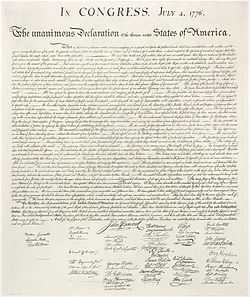Thomas Lynch, Jr.
| Thomas Lynch | |
|---|---|
 | |
| Born |
August 5, 1749 Georgetown, South Carolina |
| Disappeared |
1779 (aged 29–30) Atlantic Ocean |
| Occupation | planter |
| Known for | Signing the Declaration of Independence |
| Signature |
|
Thomas Lynch, Jr. (August 5, 1749–1779) was a signer of the United States Declaration of Independence as a representative of South Carolina; his father was unable to sign the Declaration of Independence because of illness.
Biography
He was born at Prince George Parish, Winyah, in what is now Georgetown, South Carolina, the son of Thomas Lynch. He was schooled at the Indigo Society School in Georgetown before being sent to England, where he studied at Eton College and at Gonville & Caius College, Cambridge.[1] He studied law at the Middle Temple in London, returning to America in 1772. His stepfather was South Carolina Governor William Moultrie; a nephew was South Carolina Governor James Hamilton, Jr. His grandfather was Jonas Lynch from the Galway lines of the Lynch family who were expelled from Ireland following their defeat in the Irish wars of William of Orange.
He became a company commander in the 1st South Carolina regiment in 1775 and was elected to the Continental Congress. He was taken ill at the end of 1779 and he sailed, with his wife, for St. Eustatius in the West Indies. Their ship disappeared at sea in a storm and was never found.
Before he departed for his ill fated voyage he made a will, which stipulated that heirs of his female relatives must change their surname to Lynch in order to inherit the family estate, a rice plantation. The family estate, Hopsewee, still stands in South Carolina.
References
- ↑ "Lynch, Thomas (LNC767T)". A Cambridge Alumni Database. University of Cambridge.
External links
| Wikimedia Commons has media related to Founding Fathers of the United States. |
- Thomas Lynch, Jr. at the Biographical Directory of the United States Congress
- Biography by Rev. Charles A. Goodrich, 1856
- Hopsewee
- Thomas Lynch, Jr. at Find a Grave
